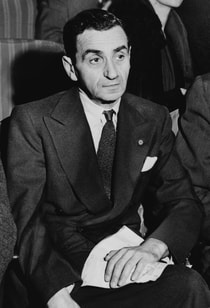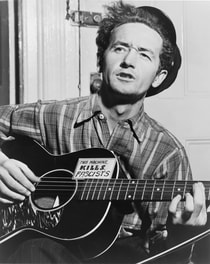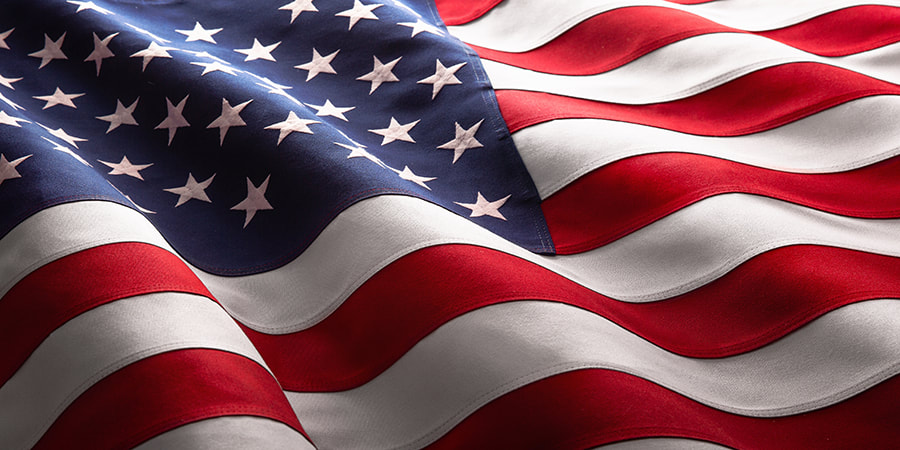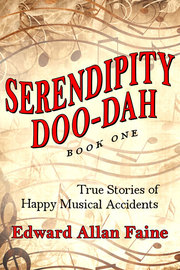- Once written, both songs were shelved—20 years in the case of “America” and four years for “This Land.”
- After they were resurrected, their original lyrics were tweaked for the better.
“God Bless America” (Irving Berlin)
 Irving Berlin, 1948.
Irving Berlin, 1948.
Aware that he would never be able to adapt to army life, the resourceful songwriter convinced the base commander to let him organize a show (produce, write the songs, everything) that would include talented draftees (many from the Big Apple entertainment industry) to entertain the troops, raise morale, and maybe do a little off-base recruiting.
Berlin “drafted” Harry Ruby from his Manhattan office to be his musical assistant, take down his songs, harmonize them, and pass them on to the arranger to do orchestrations for his big production Yip, Yip, Yaphank.
WWI was raging furiously and literally dozens of patriotic songs were coming out. Irving had even written several such numbers himself for Yip, Yip, Yaphank. When the composer brought “America” to his assistant for scoring, Ruby said, “Geez, another one?” Irving took him seriously and filed it away.
Twenty years later, when many Americans were fearing another war in Europe, Berlin thought the time might be right for a patriotic song, maybe the one he had stashed away two decades prior. But times had changed, and some lyrics needed to be modified.
First, in the original lines “Stand beside her and guide her / To the right, with a light from above,” he replaced “To the right” with “Through the night.”
The second change was more dramatic. “Make victorious on land and foam” became “From the mountains to the prairies to the oceans white with foam,” requiring a change to the melody, but all would agree, much more poetic, and oh so right. Over the years since, the lyrics have held up rather well with very little controversy.
Irving Berlin, parent of both the melody and the lyrics, and as copyright holder, willed all royalties from “God Bless America” to the Boy and Girl Scouts of America in perpetuity, specifically to programs in impoverished and disadvantaged areas, the allocation determined by the trustees of the establishing fund. As of the end of 2011, more than $10 million had been distributed to scouting organizations.[1]
“This Land Is Your Land” (Woody Guthrie)
 Woody Guthrie, 1943.
Woody Guthrie, 1943.
The self-described one-cylinder guitar picker sang at campfire gatherings and worker meetings, as well as over the radio. A few of his compositions took hold with a narrow slice of the public (”So Long, It’s Good to Know You,” “Do Re Mi,” “Ain’t Got No Home”).[2]
Riding the freights up to New York during the winter of 1940, Guthrie had been plagued by Irving Berlin’s ubiquitous “God Bless America,” which seemed to be everywhere during the winter of 1940. No piece of music had bothered him so much. It was just another of those songs that told people not to worry, that God was in the driver’s seat.
A string of words began to take shape.[3]
Once in New York, he checked into a ratty hotel near Times Square and dashed off six verses set to a tune loosely modeled on the Carter’s Family “Little Darling, Pal of Mine,” which had been based on the Southern gospel hymn “Oh, My Loving Brother.”
For the first line of the first verse, now known to millions, Woody wrote “This land is your land, this land is my land,” and at the end of each verse, “God blessed America for me,” and titled the piece “God Blessed America.” He thought no more about it for four years.
Guthrie continued his traveling ways, crisscrossing America several times, before reconnecting with protégé Pete Seeger and the Almanac folk singers in New York. After the Japanese bombed Pearl Harbor in December 1941, the Almanac singers switched from performing union/peace songs to pro-war songs. Seeger entered the army, and Woody joined the merchant marines.
When the merchantman returned to New York on shore leave in March 1944, he hooked up with folk-loving entrepreneur Moe Asch, who arranged recording sessions for Woody accompanied by a coterie of folk talent, including Lead Belly and Sonny Terry. Guthrie laid down hundreds of songs, some traditional, some his.[4]
One of the last songs recorded by Asch in late April was Woody’s Irving Berlin parody, or as the irascible folksinger initially intended, a Marxist response to “God Bless America” he had called “God Blessed America.” But now, he had changes, a new tag line at the end of each verse “This land was made for you and me,” and a new title “This Land Is Your Land.”[5]
All would agree, much better.
But not everyone agreed with two of the six verses, the so-called private property and welfare line verses considered an anathema to conservative folks. In the former, Woody wrote of a “No Trespassing” sign with nothing on the other side, the side for you and me. In the latter, he told of hungry people at the relief office and wondered if this land is for everyone.
With the passage of time, the “offensive” verses got left behind (except at gatherings of liberal-leaning folks), and the remaining four verses became the sheet music and schoolbook standard for a grateful nation to sing.[6]
It is this version that was often touted as a replacement for the “Star-Spangled Banner” as the national anthem. “This Land” was used as an advertising jingle by United Airlines and the Ford Motor Company, and as the theme song for George McGovern’s 1972 presidential campaign.[7]
Woody is the copyright holder for the lyrics, the royalties designated to the Guthrie family. The copyright and royalties for the melody part is less clear.
Despite what the Berlin/Guthrie songs do—and do not—have in common, and the fact that one was borne in protest of the other, both songs are worthy anthemic tributes to the country they share.
- Edward Allan Faine, Serendipity Doo-Dah, Book One: True Stories of Happy Musical Accidents (Takoma Park, MD: IM Press, 2017), 30–31.
- Dorian Lynskey, 33 Revolutions per Minute: A History of Protest Songs, from Billie Holiday to Green Day (New York: Ecco, 2011), 14–25.
- Joe Klein, Woody Guthrie: A Life (New York: Delta, 1999), 140–41.
- Dorian Lynsky, 33 Revolutions, 27–28.
- Joe Klein, Woody Guthrie, 287.
- Dorian Lynsky, 33 Revolutions, 30.
- Joe Klein, Woody Guthrie, 454.




 RSS Feed
RSS Feed